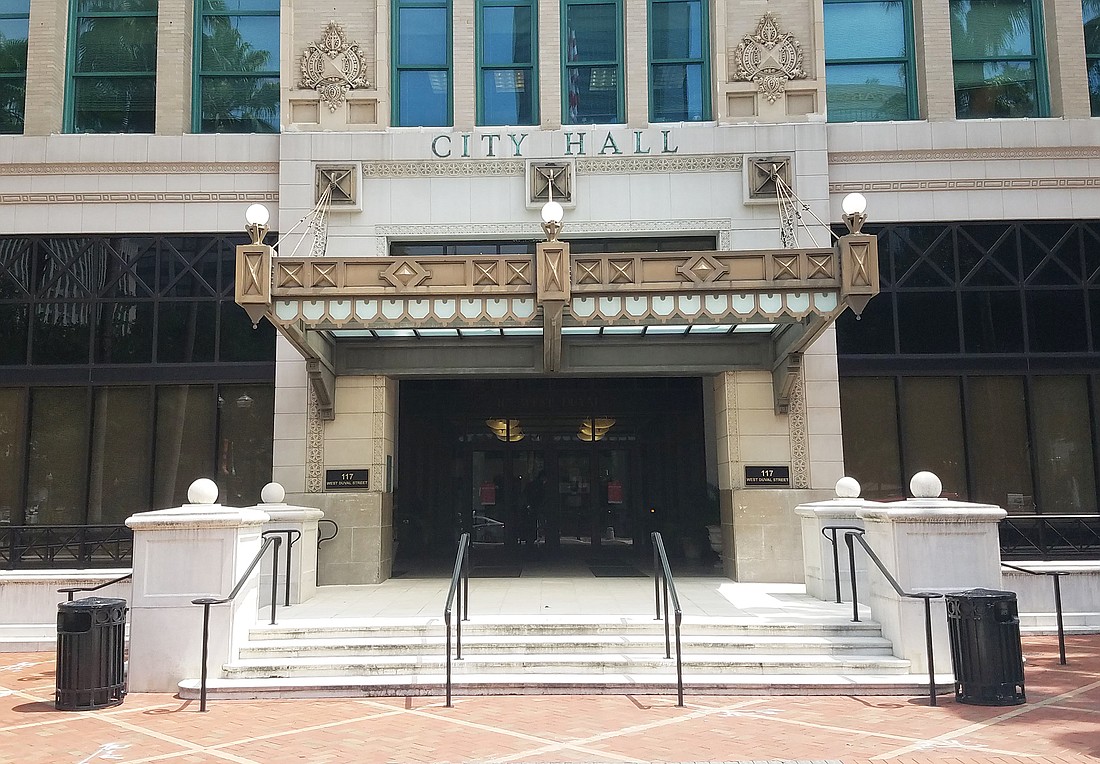
The Jacksonville City Council voted 16-1 on July 29 to keep property tax rates flat in Duval County after a 90-minute debate led by Finance Committee Chair Matt Carlucci to raise the city’s millage rate.
The Council signed off on the tax rates Mayor Lenny Curry proposed July 15 in his $1.34 billion fiscal year 2020-21 budget.
The rate remains unchanged at $11.4419 per every $1,000 of taxable property value. The tax rate for the Beaches was set at $8.1512 per every $1,000 of taxable value and the city of Baldwin at $9.6312 per every $1,000 of taxable value.
Although the millage rate will stay the same, some Duval County property owners could see an increase in their bill because of increasing property values.
Jacksonville homeowners with a $150,000 home and a $50,000 state of Florida homestead exemption would pay about $1,144 in city taxes. The rate does not affect the Duval County Public Schools tax rate or property taxes from any other government entity.
The millage rate approved July 29 is preliminary. Council will set the permanent rate when it votes on the 2020-21 budget before Oct. 1.
Council budget hearings begin in August.
Tax increase fails
Carlucci’s floor amendment to raise the tax rate by ¼ mill failed in a 6-11 vote.
His proposal was based on a recommendation from City Council Auditor Kim Taylor.
The ¼-mill increase would have generated an estimated $16.6 million, according to Carlucci. Taylor said the money could have provided Council a buffer if the Curry administration’s revenue projections fall short or errors found in the budget review process.
“We are certainly in unprecedented times right now in forecasting revenues,” Taylor said.
The state of Florida’s estimate for Jacksonville’s portion of shared revenue released July 29 was $88 million, according to Taylor. The Curry administration’s proposed budget projects $94 million from the state.
Taylor said the Council Auditor’s office has yet to analyze and verify $480 million in projected revenue in Curry’s budget.
“We are in a pandemic. I understand that. It had an effect on many of our citizens but also could be having an unprecedented effect on our city budget,” Carlucci said. “We will not know what effect it’s had until we get into our budget hearings and perhaps beyond.”
For Duval County homeowners, Carlucci’s proposal would have increased property tax payments on a $100,000 home with a $50,000 homestead exemption by $12.50, according to calculations by the Council Auditor’s Office.
A $200,000 home would have had a $37.50 increase.
Commercial property owners would have seen their annual tax bill rise by $125 for a property valued at $500,000. The bill on a $1 million commercial property would have risen by $250.
Carlucci proposed using the extra revenue for at-risk youth and mental health services or other quality of life projects if it was not needed to balance the budget.
“Jacksonville is a great city, but we can become greater if we begin investing in ourselves,” Carlucci said. “If you want a better city, you’ve got to pay for it. We need to start investing in our people.”
The votes
Carlucci and council members Joyce Morgan, Reggie Gaffney, Garrett Dennis, Ju’Coby Pittman and acting Council Vice President Brenda Priestly Jackson voted in favor of the increase.
Council members Aaron Bowman, Scott Wilson, LeAnna Cumber, Micheal Boylan, Randy DeFoor, Randy White, Ron Salem, Danny Becton, Al Ferraro and acting Council President Samuel Newby voted against.
Council President Tommy Hazouri was absent, recovering from a lung transplant. Council member Terrance Freeman also was absent.
Bowman said raising taxes during a time of high unemployment is not the right decision.
“This is absolutely the wrong time to tell our constituents that we might raise their taxes,” Bowman said. “We just received a balanced budget, significantly higher than last year. No services were cut … and we also have a very comfortable reserve.”
Council member LeAnna Cumber argued that if revenue projections change and the budget doesn’t balance, the city can use its reserves, which sit at $187 million, for one-time expenditures or make cuts.
The only vote against the flat millage rate was from Priestly Jackson.
She said revenue targets need to be made to ensure the Council’s pledge to invest in infrastructure projects in undeserved and historically disenfranchised neighborhoods are upheld.
“I am hearing now that our ideology to say we will not raise taxes means we’re willing to continue to compromise the quality of life for some of our neighbors,” Priestly Jackson said. “Because if you don’t that the money to address the broken promises … then we’re not doing anything different than just talking as others have talked.”